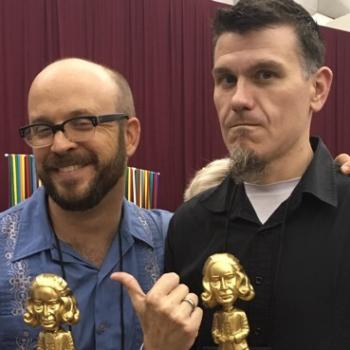I’m continuing my travelogue through Willie Jennings’ Christian Imagination as a way of coping with the tedium of Virginia’s Annual Conference. Chapter two of Jennings’ book is called “Acosta’s Laugh.” It concerns the perspective of 16th Jesuit theologian Jose Acosta who was one of the first Europeans to develop theology within the context of the New World, in Acosta’s case Peru.
Acosta writes about the challenge he faced in educating natives about the gospel. He observes that the natives have an elaborate set of rituals they do related to every interaction they have with nature, such as crossing rivers, planting crops, etc. In Acosta’s view, the natives had to be purged of these rituals prior to being indoctrinated with Catholicism because the rituals represented a form of demonic worship rather than a genuine though confused response to the presence of God in nature which needed to be refined & redirected.
Jennings accuses Acosta of a form of the Docetist heresy. Docetism was an early heresy which claimed that Jesus wasn’t a fully physical human but only what seemed to be a human (from which the word Docetism is derived). The Docetists were offended by the notion that the Word of God could assume the embarrassing “dirtiness” of a completely material body in Jesus (this scandal of course being the main point of the Incarnation). The Docetism Jennings accuses the colonial theologians of has its source in the same anti-material bias. It presumes that God cannot be experienced in the natural world because God is necessarily something that can only be talked about in idealistic abstraction.
So in other words, when Acosta sees a native thanking the river for its water, he doesn’t affirm the native’s spirit of gratitude and say gently that the source of the river and its water is actually God; he says instead that the native’s interconnectedness with nature is itself demonic and the native should be rebuked for feeling a spiritual connection to the river since God is supposed to be contemplated solely as part of an abstract doctrine in accordance with Western philosophical tradition.
I’m not sure whether I can make a convincing case for this application of Docetism or whether that would be accessible to a non-seminary nerd reading this blog. I think the real application question for us as Christians who share the gospel with others is whether God can bring about realizations through their life experiences prior to and independent of our role in His process as proclaimers of verbal words and propositional arguments. Can God use the river to speak to people who have never heard of Jesus? Can God be at work even if I’m not involved?
I wonder to what degree the high view of doctrine in evangelical Christianity is about control. If words and concepts are the sole means of God’s grace as opposed to waterfalls and rainbows or the sacramental rites of the Catholic tradition, then the one with the right words are the ones who have been endowed with divine power, and our doctrinal loyalty competitions concern our need to be indispensable to God’s process as conduits of His right words.
In Wesleyan theology, we talk about the concept of prevenient grace, which means the grace that goes before us. We believe that God is constantly striving to reach out to every creature with His love. Prevenient grace suggests that God uses rivers and rainbows and beautiful landscapes in addition to missionaries with verbal gospels.
This basic premise creates a different attitude about what sharing the gospel with people entails. Instead of being a purging of demonic influence as it was for Acosta, it’s about helping people to pull together the raw material God has preveniently provided in their lives to see the story of God’s deliverance. We use the lens of scripture to interpret the story God has also told us through the rivers and the rainbows we encounter.
We can say a lot of things about the rivers and the rainbows of life. Our tendency in today’s world is to be cynical and indifferent to the beauty of God’s creation. The most beautiful story we can tell is that they are an expression of the same love of the God who gave up His Son to draw us into His arms. The only way we can help others to tell this story is to respect that God has been at work in their lives long before we ever came around. We are part of a process of God’s evangelistic outreach that is way bigger than us, our words, and our doctrines.











